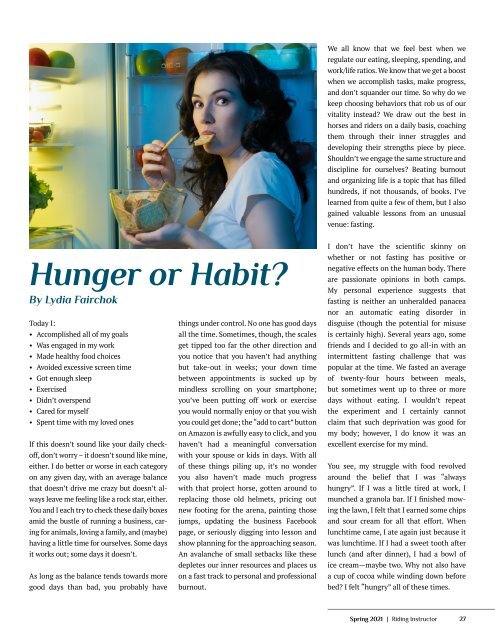Riding Magazine - FINAL Spring 2021 - v7 (002)
You also want an ePaper? Increase the reach of your titles
YUMPU automatically turns print PDFs into web optimized ePapers that Google loves.
We all know that we feel best when we<br />
regulate our eating, sleeping, spending, and<br />
work/life ratios. We know that we get a boost<br />
when we accomplish tasks, make progress,<br />
and don’t squander our time. So why do we<br />
keep choosing behaviors that rob us of our<br />
vitality instead? We draw out the best in<br />
horses and riders on a daily basis, coaching<br />
them through their inner struggles and<br />
developing their strengths piece by piece.<br />
Shouldn’t we engage the same structure and<br />
discipline for ourselves? Beating burnout<br />
and organizing life is a topic that has filled<br />
hundreds, if not thousands, of books. I’ve<br />
learned from quite a few of them, but I also<br />
gained valuable lessons from an unusual<br />
venue: fasting.<br />
Hunger or Habit?<br />
By Lydia Fairchok<br />
Today I:<br />
• Accomplished all of my goals<br />
• Was engaged in my work<br />
• Made healthy food choices<br />
• Avoided excessive screen time<br />
• Got enough sleep<br />
• Exercised<br />
• Didn’t overspend<br />
• Cared for myself<br />
• Spent time with my loved ones<br />
If this doesn’t sound like your daily checkoff,<br />
don’t worry – it doesn’t sound like mine,<br />
either. I do better or worse in each category<br />
on any given day, with an average balance<br />
that doesn’t drive me crazy but doesn’t always<br />
leave me feeling like a rock star, either.<br />
You and I each try to check these daily boxes<br />
amid the bustle of running a business, caring<br />
for animals, loving a family, and (maybe)<br />
having a little time for ourselves. Some days<br />
it works out; some days it doesn’t.<br />
As long as the balance tends towards more<br />
good days than bad, you probably have<br />
things under control. No one has good days<br />
all the time. Sometimes, though, the scales<br />
get tipped too far the other direction and<br />
you notice that you haven’t had anything<br />
but take-out in weeks; your down time<br />
between appointments is sucked up by<br />
mindless scrolling on your smartphone;<br />
you’ve been putting off work or exercise<br />
you would normally enjoy or that you wish<br />
you could get done; the “add to cart” button<br />
on Amazon is awfully easy to click, and you<br />
haven’t had a meaningful conversation<br />
with your spouse or kids in days. With all<br />
of these things piling up, it’s no wonder<br />
you also haven’t made much progress<br />
with that project horse, gotten around to<br />
replacing those old helmets, pricing out<br />
new footing for the arena, painting those<br />
jumps, updating the business Facebook<br />
page, or seriously digging into lesson and<br />
show planning for the approaching season.<br />
An avalanche of small setbacks like these<br />
depletes our inner resources and places us<br />
on a fast track to personal and professional<br />
burnout.<br />
I don’t have the scientific skinny on<br />
whether or not fasting has positive or<br />
negative effects on the human body. There<br />
are passionate opinions in both camps.<br />
My personal experience suggests that<br />
fasting is neither an unheralded panacea<br />
nor an automatic eating disorder in<br />
disguise (though the potential for misuse<br />
is certainly high). Several years ago, some<br />
friends and I decided to go all-in with an<br />
intermittent fasting challenge that was<br />
popular at the time. We fasted an average<br />
of twenty-four hours between meals,<br />
but sometimes went up to three or more<br />
days without eating. I wouldn’t repeat<br />
the experiment and I certainly cannot<br />
claim that such deprivation was good for<br />
my body; however, I do know it was an<br />
excellent exercise for my mind.<br />
You see, my struggle with food revolved<br />
around the belief that I was “always<br />
hungry”. If I was a little tired at work, I<br />
munched a granola bar. If I finished mowing<br />
the lawn, I felt that I earned some chips<br />
and sour cream for all that effort. When<br />
lunchtime came, I ate again just because it<br />
was lunchtime. If I had a sweet tooth after<br />
lunch (and after dinner), I had a bowl of<br />
ice cream—maybe two. Why not also have<br />
a cup of cocoa while winding down before<br />
bed? I felt “hungry” all of these times.<br />
<strong>Spring</strong> <strong>2021</strong> | <strong>Riding</strong> Instructor 27

















